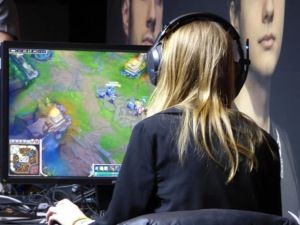News
Game over? Popular in successful Denmark, but women are marginalised
This article is more than 5 years old.
Women face a fight to break into Danish gaming, but thanks to DGI Esport’s initiative ‘Piger i Esport’, they have a handy ally in their corner

A male opponent told her to “go back to the kitchen and make [him] a sandwich” (photo: Pikist)
With the huge popularity of the Netflix series ‘The Queen’s Gambit’, the gifted chess-playing central character Beth Harmon (Anya Taylor-Joy) has been inspiring women the world over with a demonstration of how a girl can step into – and dominate – a distinctly male world.
Echoes in eSports
The appeal of the story is that chess is a test of the mind. There’s no biological factor that could give men an advantage, or really justify any gender divide between male and female players.
And this is also true of eSports, a male-dominated arena in which women are increasingly taking large strides.
All-female teams like Dignitas Fe(male) and CLG Red have been stomping male teams across the CS:GO scene, while players like Mystik, Scarlett, HaganeNoTema and Liooon are winning fans and hundreds of thousands in earnings through their sheer hard work, dedication and a refusal to back down.
Liooon recently became the first woman to win a Blizzcon title after she won the 2019 Hearthstone global finals. She’s been made a Grandmaster, underlining her icon status for women in the eSports industry.
Her Hearthstone victory speech was one to be remembered: “I want to say for all the girls out there who have a dream for eSports competitions, for glory, if you want to do it and you believe in yourself – you should just forget your gender and go for it.”
But it would appear her words are wasted on the women of Denmark.
Popular in Denmark
Danes who follow home-based teams like Astralis (CS:GO) or Origen (League of Legends) know the stakes are high in the competitive gaming scene.
Last year, market reports valued the eSports industry at over 1 billion dollars and rising and, with an estimated global audience of 425 million fans, eSports events are selling out stadiums.
The 2019 League of Legends World Championships broke records last year, as matches played across venues in Berlin, Madrid and Paris reached 44 million concurrent viewers, with players competing for a prize pool of 2.2 million dollars.
It’s a professional sport with all the trimmings: world-class gaming set-ups, sponsorship deals, player merchandise, gaming coaches, team houses and dedicated fans tuning in from all over the globe.
And Denmark is well placed to capitalise. A DR study found that 70 percent of girls aged 13-19 play computer games (compared to 96 percent of boys), so why aren’t there more emerging female gamers in Denmark?
Stuck in the Dark Ages
It’s become routine for women to face sexism, derogatory comments and harassment when entering the gaming scene, contends Mikkel Kyed of the Danish organisation DGI Esport. “Almost all women have encountered these experiences,” he told CPH POST.
During the company’s research into women’s experiences in gaming, DGI Esport has found it’s not uncommon for women to be targeted due to their gender.
“They’ll hear ‘You’re not as good as me because you’re a girl, so go back to the kitchen and make a sandwich’,” lamented Kyed. “It’s a big problem within gaming.”
And despite the aforementioned female gamers enjoying breakthroughs, it is a worldwide problem.
In an interview with the BBC, Steph ‘Missharvey’ Harvey estimates the female share of competitive eSports players is as low as 5 percent.
“It’s still a ‘boys club’, so as a woman you’re automatically judged for being different. The way I get harassed is about what they would do to my body, and about why I don’t deserve to be there because I use my sexuality – it’s all extremely graphic,” she said.
Fighting back
Strangely, the world of eSports has come to echo what we’ve seen throughout sports history. Whether we look at chess or the resistance to introduce a women’s Olympic marathon (they had to wait until 1984), the input of women has been routinely overlooked or discouraged. The world of eSports also has the potential to shake the pillars of that status quo.
“In eSports there isn’t any particular physical advantage for boys, but what we do have is a cultural difference – so what we need to work towards is cultural change,” contended Kyed.
And that’s exactly what DGI Esport is looking to do with its project ‘Piger i Esport’, which is enlisting organisations from across Denmark for a push to bring more girls into the world of gaming: from locally hosted LAN parties to female gaming leagues.
“We have women as trainers and on the boards of the organisation, so we’re on the right path,” enthused Kyed.
“What we want now are more women and girls to come and get experience in gaming – and have them help us out in shaping the future of the sport – so we can inspire the cultural change that needs to happen.”
Denmark still well placed
It’s no small goal. But with women stepping up their game across the world, it feels like a change that’s already on the way – and Denmark is surprisingly well placed to be at the forefront.
While South Korea and China are known to take home the championship trophies – relative to its population, Denmark has the highest number of active eSports players in the world, and the women’s team Copenhagen Flames have been making recent inroads.
Denmark is uniquely positioned to make professional eSports an accessible reality for a new generation of girls – so if Beth Harmon can bring women to the chess board, why not eSports as well? The controller’s there. It’s your move.










































